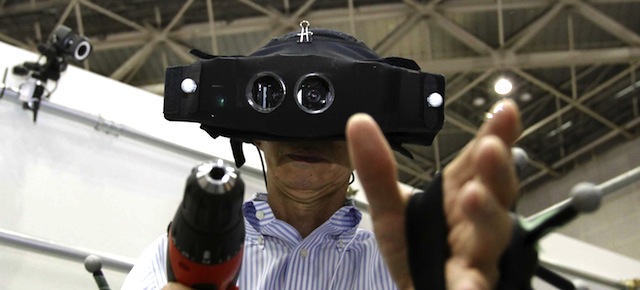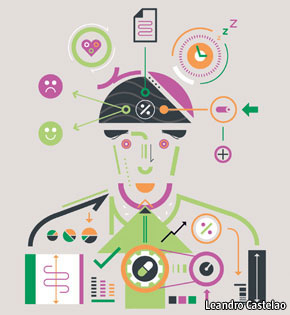
 They’re calling 2014 “The Year of the Wearable” in the tech world. Love or hate Google glass, it seems as if wearable tech is in the future- if not for us, then perhaps for our kids. Smart watches want to replace your smart phone. Smart wristbands want to track all your steps and exercise movements. Over 100 apps exist to quantify the quality of your sleep. There’s even a tiny camera that you can clip to your shirt pocket that takes photos every five seconds and uploads the photos to your social network of choice. It used to be that only God knew the number of hairs on my head, but at the rate things are moving I won’t be surprised to discover a computerized hat that could count them all for me. Call it digital omnipotence, call it the quantification of the self, but this trend of lifelogging- storing extreme amounts of data about one’s day-to-day life for later review- could be the next step forward in the future of social networking.
They’re calling 2014 “The Year of the Wearable” in the tech world. Love or hate Google glass, it seems as if wearable tech is in the future- if not for us, then perhaps for our kids. Smart watches want to replace your smart phone. Smart wristbands want to track all your steps and exercise movements. Over 100 apps exist to quantify the quality of your sleep. There’s even a tiny camera that you can clip to your shirt pocket that takes photos every five seconds and uploads the photos to your social network of choice. It used to be that only God knew the number of hairs on my head, but at the rate things are moving I won’t be surprised to discover a computerized hat that could count them all for me. Call it digital omnipotence, call it the quantification of the self, but this trend of lifelogging- storing extreme amounts of data about one’s day-to-day life for later review- could be the next step forward in the future of social networking.
One tech blogger- Max Knoblauch over at Mashable- spent 30 days lifelogging with the help of his smartphone, a fitness analyzing wristband, and a few popular apps. His observations on the trend might be a little suspect insomuch as they’re exactly what we’d expect them to be– the title of the article is “Lifelogging: The Most Miserable, Self-Aware 30 Days I’ve Ever Spent.” That said, some of Max’s observations are particularly illuminating:
I’ve taken approximately 4,056 steps so far today. As a 6’2″ bipedal mammal, that amounts to about 1.97 miles. Last night, I slept for 6.1 hours, with my deepest sleep period beginning at 2:10 a.m. and lasting for roughly two hours. If I had to rate my mood from 1 to 100, which I do, I’d place it somewhere around 73.
There — I’m quantified.
If you haven’t noticed, the art of lifelogging and personal data tracking once reserved for medics and athletes has permeated mainstream culture. Jawbones, FuelBands, Fitbits and countless other wearables adorn the wrists of an ever-growing percentage of the tech-savvy population. A quick mobile App Store search for “Sleep Tracker” yields 124 results. Multiple major publications have dubbed 2014 “The Year of the Wearable.” To put it succinctly: We’re in it deep…
…With a handful of apps, I begin tracking my daily activities. Using MyFitnessPal to track my diet, Sleepbot to track my sleeping habits, Fitbit to sync my movements from my wristband and Felton’s Reporter to measure almost everything else, I log everything from the existential “Are you looking forward to today?” to the trivial, “What do you smell?”
It is not enjoyable.
Manual data input, as it turns out, is a hindrance to the daily activity it’s supposed to be tracking. I frequently put my book down to tell my phone that I’m reading, take my phone out at dinner to let it know I smell hamburgers and zone out of conversations to tell it who I’m talking to. Have you seen Her? It’s a lot like Her.
In order to get a realistic scope of my day, Felton recommended I record my activities every 90 minutes. That’s a pretty sizable chunk of time, so I decided it’s only accurate to also track the time I spend tracking. For a brief moment I tried to track the time I spent tracking my tracking, but I found it too disruptive to my tracking….
Nonetheless, I begin to yield some more revealing results as well. Contrary to my expectations, I actually have a pretty normal sleeping schedule. My vitamin C consumption is right up there with other human males of my size. I talk to my parents more often than they think I do.
Visualized on my phone, my mediocrity is truly a sight to behold.
Knoblauch’s dry humor is refreshing, perhaps because he has a self-professed skepticism for the lifelogging movement. What could I actually do with the knowledge that household cleaners were my most-smelled scent of 2013? More importantly, while lifelogging might be helpful for nutrition and exercise, the chief beauty of the experiment is its reaffirmation of mediocrity. With all the latest technology and software (and also the collective knowledge of all mankind on the internet) available at the flick of the wrist or a verbal que to Siri, the empirical evidence of the experiment suggests “you’re normal and not really that unique.”
There’s a lot more to be said about a movement dedicated to life improvement through personal data analysis: will knowledge alone produce the proactive effort necessary for self improvement? Has quantification really worked in any arena outside of professional marketing or sports? Not only that, but Knoblauch’s 30 days of misery testimony leads me to suspect that in-depth status updates every 90 minutes actually prevent helpful Lent-esque reflection that would lead to a better self. This new trend has the law of transformation written all over it, replete with the anxiety and frustration that law can bring. After all- what would you do with the data other than identify areas of weakness for improvement?
You can’t be loved without being known, and I think there’s something about this data and tech obsession related to that. Perhaps if we know ourselves better, we could love ourselves better? I’m not so sure. That said, there is One who does know the number of hairs on our head, the miles we walked or didn’t walk to stay healthy, the snack we forgot to enter into myfitnesspal, and the other things we’ve done and the things left undone- and yet he still loves us. Omnipotence from technology might give us a little more control of ourselves (a temptation indeed!), but I’d rather take my chances with an external omnipotence that doesn’t leave when I don’t measure up.
Content Advisory for Juvenile Jokes about Human Feces

COMMENTS
4 responses to “Lifelogging Mediocrity and The Quantified Self”
Leave a Reply














The title caught my eye and reminded me of “Woman satisfied, having reached the peak of mediocrity,” an art piece by Shari Elf: http://www.flickr.com/photos/jumble/6212633297/
So now when I look at that pile of aquarium gravel that the second-place paintbrush is standing on, I’ll think of it as her life’s data, quantified. Thanks for the post!
I want this data. I’ll do the data analysis, A/B testing on self to see improvements or not. I don’t go to doctors, I need this. This is incredible, monumental stuff that is going on in med tech and you call it boring? Not to me. It’s mind boggling what can be done. Now, if we could have the FDA exit stage left, we could really have personalized health. Sure some of this is in the infant stage and will soon be dropped, but the potential, the real ways this can be used to make real differences is awesome. Game changer.